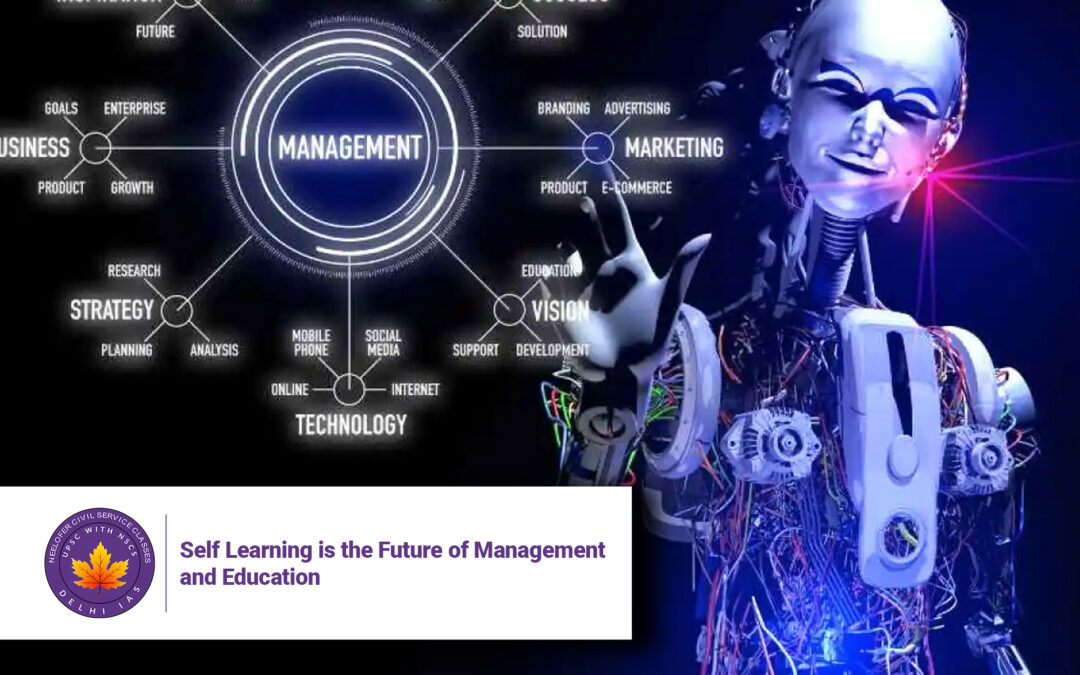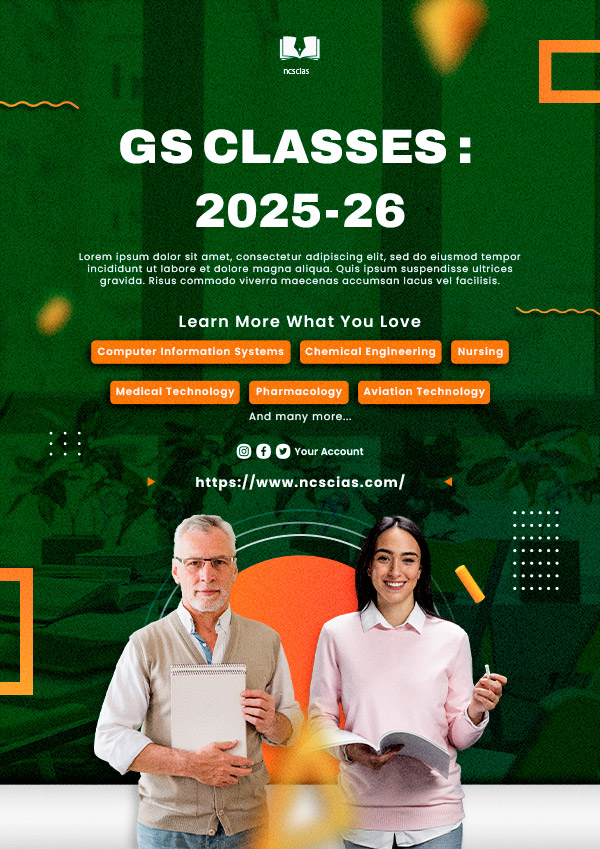Self Learning is the Future of Management and Education
Why in News
With rapid advancements in artificial intelligence (AI), automation, and technological integration across sectors, the focus on self-learning has emerged as one of the most critical aspects of education and management. Traditional classroom models, which emphasize standardized curricula and examinations, are proving inadequate to meet the dynamic requirements of the present and future workforce. A recent discussion in The Pioneer highlighted the increasing necessity for individuals to cultivate self-learning abilities to thrive in an ever-changing world.
Introduction
The concept of self-learning is not new, but its relevance has expanded tremendously in today’s knowledge-driven economy. Management education and professional training often revolve around structured processes – the “how” of achieving tasks. However, this approach, while important, cannot solely prepare learners for the uncertainties and complexities of modern challenges. Instead, the ability to adapt, innovate, and continuously acquire new skills becomes indispensable.
As AI reshapes the global landscape, educational systems are being compelled to shift from rote-based, classroom-oriented methods to models that emphasize critical thinking, problem-solving, and self-motivation. Lifelong learners capable of managing themselves, keeping knowledge alive, and applying skills innovatively are now the real drivers of growth and sustainability in both academia and corporate spaces.
Key Issues and Background
- The Traditional Focus on “How”:
Management education often concentrates on the “how” of processes – sequencing tasks, allocating resources, and ensuring execution. While valuable, this approach narrows the scope of learning, reducing education to operational skill acquisition without encouraging independent thought or adaptability. - Judgement vs. Skills:
Successful management requires more than technical skills. The timing of actions, judgement of situations, and decision-making play critical roles. Unlike mechanical skills, these attributes cannot be taught through textbooks but must be cultivated through reflection, practice, and internal aptitude. - Self-Development and Internal Drive:
Skills such as problem-solving, strategic thinking, and creativity demand an internal drive. Learners need a mindset inclined towards innovation and self-improvement to keep pace with technological and industrial shifts. - Organic Growth of Skills:
Merely enumerating skills is insufficient. Real learning involves fostering organic talent, creativity, and adaptability. Learners should be able to link different skills, integrate them with situational awareness, and apply them holistically. - The Challenge of Engineering Education as a Case Study:
For example, in engineering, the emphasis is often on technical accuracy – the nature of materials, structures, or designs. However, broader applications demand an ability to abstract concepts, think critically, and adapt knowledge to dynamic environments. - Facilitation for Lifelong Learning:
The role of educational institutions should go beyond providing content. They must also enable learners to teach themselves. This requires generating tools, content, and ecosystems where students can thrive independently, ensuring that their learning process never becomes stagnant.
Specific Impacts or Effects
- On Education Systems:
Self-learning challenges the conventional teaching model. It requires schools, universities, and training centers to design courses that prioritize clarity on knowledge while also leaving room for learners to explore beyond. The demand is shifting from knowledge delivery to knowledge facilitation. - On Students:
Learners are increasingly expected to move from passive recipients of information to active seekers of knowledge. This shift instills responsibility, builds confidence, and develops critical problem-solving skills, making them more adaptable in real-life scenarios. - On Professionals and Managers:
In management, the ability to continuously learn and adapt is now a competitive edge. Managers who rely solely on pre-learned skills may quickly become obsolete. Instead, those who engage in self-learning remain innovative, versatile, and effective in complex, fast-changing environments. - On Organizations:
Companies benefit from employees who are self-driven learners. Such individuals not only keep themselves updated with industry changes but also bring in new ideas, innovations, and problem-solving strategies that benefit the organization as a whole. - On Society:
A society built on lifelong learners is better equipped to address complex socio-economic challenges, adapt to technological disruptions, and sustain economic growth. Education and self-learning, therefore, serve as foundational elements for societal resilience.
Challenges and the Way Forward
- Challenge of Motivation:
Self-learning demands intrinsic motivation, which not all individuals naturally possess. Creating systems that encourage curiosity, provide recognition, and build self-discipline is critical. - Resource Accessibility:
While digital tools, online courses, and e-libraries have increased access, disparities in technology availability and affordability remain a barrier. Bridging this digital divide is essential to make self-learning universal. - Redefining Teacher Roles:
Teachers must transition from content-deliverers to facilitators and mentors. This requires training and restructuring the very foundation of educational delivery systems. - Assessment Systems:
Traditional examinations evaluate memory and standard responses. For self-learning to flourish, assessments should focus on creativity, adaptability, critical thinking, and real-world applications. - Integration of AI and Technology:
Artificial intelligence, rather than being a replacement, should act as an enabler of self-learning. Adaptive learning platforms, AI-driven personalized content, and intelligent tutoring systems can create dynamic, student-centric educational ecosystems.
Conclusion
The future of management and education lies not in rote memorization or the mechanical completion of tasks but in fostering an environment where individuals take charge of their own learning. Self-learning, supported by AI-driven technologies and guided by a culture of innovation, is the most effective way forward. It ensures that learners remain relevant, adaptive, and capable of thriving in uncertain futures.
Building such a system will require collaboration between policymakers, educators, institutions, and learners themselves. The shift from teaching content to enabling self-learning is not merely a pedagogical adjustment – it is a societal transformation. In this transformation, every individual becomes a lifelong learner, equipped with the skills, insights, and motivation to keep knowledge alive and relevant.
5 Questions and Answers
Q1. Why is self-learning becoming more important in today’s education and management systems?
A1. Because the world is rapidly changing due to AI, automation, and global challenges, traditional classroom learning alone cannot prepare individuals. Self-learning allows for adaptability, continuous growth, and innovation, making learners capable of addressing real-world complexities.
Q2. How does self-learning differ from traditional education?
A2. Traditional education often emphasizes standardized teaching and rote memorization, whereas self-learning emphasizes critical thinking, creativity, adaptability, and lifelong knowledge acquisition. It encourages learners to take responsibility for their own progress.
Q3. What role do teachers play in a self-learning ecosystem?
A3. Teachers act as facilitators, mentors, and guides. Their responsibility is to create environments where learners are encouraged to think independently, explore deeply, and keep their curiosity alive, rather than just delivering content.
Q4. What challenges hinder the widespread adoption of self-learning?
A4. Key challenges include lack of intrinsic motivation among learners, limited access to resources (especially in underdeveloped regions), rigid assessment systems, and the need to retrain teachers for facilitation-based roles.
Q5. How can artificial intelligence support self-learning?
A5. AI can provide personalized learning experiences, adaptive content, and intelligent tutoring systems. By analyzing learner progress and customizing resources, AI can act as a supportive partner in self-learning, ensuring each individual progresses at their own pace.





